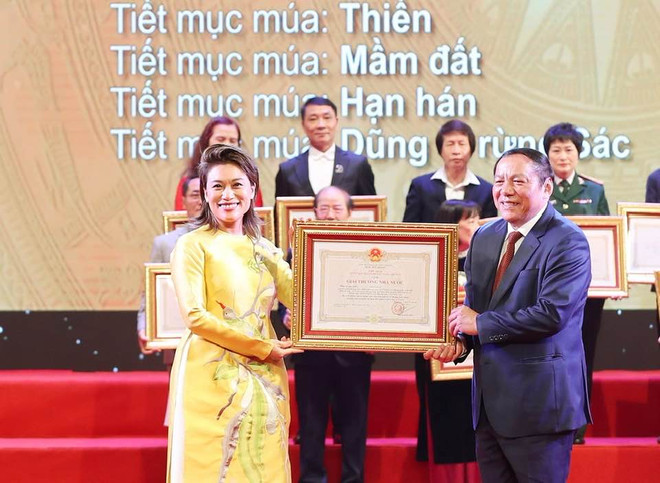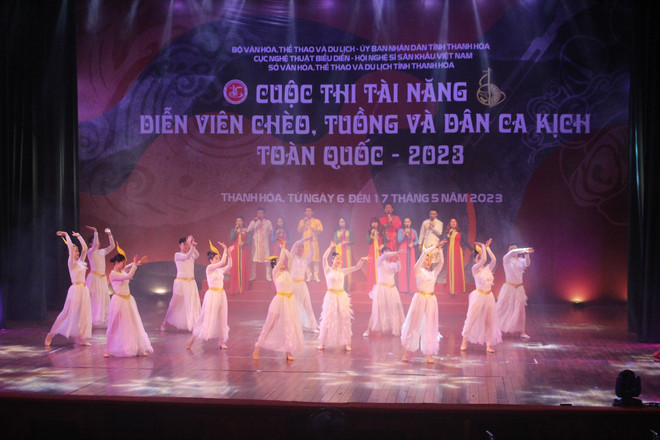Hanoi (VNA) - The cultural industry bears substantial value and possesses the potential to propel the development of various sectors.
In recent times, the government has shown a strong commitment towards the growth of the cultural industry. This was evident at the National Conference on the Development of Cultural Industries and the conference reviewing tasks in 2023, while outlining key objectives for 2024, organized by the Ministry of Culture, Sports, and Tourism.
Given its richness, diversity, creativity, and uniqueness, in 2024, Performing Arts is poised to be a central focus in the development of Vietnam's cultural industry.
Vietnamplus held an interview with People's Artist Tran Ly Ly, Director of the Performing Arts Department on a plan to elevate Performing Arts to become a key sector in the cultural industry.
Strong revival of performing arts
How would you assess the performance of the Performing Arts sector in 2023?
Director Tran Ly Ly:
The past year brought great joy as the Performing Arts industry experienced a strong resurgence following the challenging period of COVID-19. The entire industry has embraced a renewed spirit of enthusiasm and determination.
This revival can be attributed to the collective efforts of agencies, organisations, as well as the supportive policies implemented by the Ministry of Culture, Sports, and Tourism, and the Government.
 People's Artist Tran Ly Ly, Director of the Performing Arts Department, is honored with a national award for Literature and Art. (Photo: VNA)
People's Artist Tran Ly Ly, Director of the Performing Arts Department, is honored with a national award for Literature and Art. (Photo: VNA)Numerous nationwide competitions were organised, including the Fall Music Competition, National chamber singing, musical theater, and talent competitions for circus actors, cai luong (reformed opera), puppetry, dance and drama. Each genre of Performing Arts requires its own dedicated platform to discover and nurture young talents.
Decentralisation has been promoted in management and granting license to performance activities. In the past, event organizers were required to directly contact the Ministry of Culture, Sports, and Tourism for a license. However, under Decree No. 144 on art performances, they can now approach the Provincial and City People's Committee instead.
This change signifies an enhanced role for local authorities in event management. Provincial and municipal Departments of Culture now have a greater responsibility to carefully inspect and ensure the quality of art events in their localities.
 An art performance at the closing night of the National Competition for talented performers in 2023 (Photo: VNA)
An art performance at the closing night of the National Competition for talented performers in 2023 (Photo: VNA)- In addition to public art units, how do you perceive the progress made by private art units throughout the country?
Director Tran Ly Ly:
Apart from the 12 theaters under the Ministry of Culture, Sports, and Tourism, private art units and individual artists have also been engaged in high-quality artistic activities, including the Monsoon International Music Festival in Hanoi and the Ho Do (Hozo) International Music Festival in Ho Chi Minh City.
Bold investment in cultural industry
- Recently, the development of the cultural industry, aiming to contribute 7% to the GDP, has been discussed in various forums. How do you assess the potential of the Performing Arts sector within Vietnam’s Cultural Industry Development Strategy?
Director Tran Ly Ly:
I hold the belief that the evolution of the cultural industry must not overlook traditional arts, as they constitute a vital foundation for crafting contemporary and future-oriented creations.
The preservation of traditional art is essential for the advancement of contemporary art. Therefore, it is crucial to focus on building human resources in traditional arts.
During recent conferences on the cultural industry, we were pleased to hear the guidance provided by Party and State leaders, as well as the insights and solutions presented by experts and stakeholders from related industries.
We firmly believe that the Performing Arts sector will play a pivotal role within the cultural industry. Music concerts and fashion shows not only captivate audiences but also attract tourists.
We hope that investors will accurately recognise the potential of the Performing Arts industry within the broader framework of the cultural industry.
What specific development strategy does the sector have to make further strides in the cultural industry?
Director Tran Ly Ly:
Developing an industry cannot be solely based on short-term plan but requires a long-term strategy. The Ministry of Culture, Sports, and Tourism is currently formulating a comprehensive strategy for the development of the cultural industry, along with specific programs aimed at contributing 7% to the GDP. We will follow this plan step by step.
From my perspective, the cultural industry transcends a singular locality or ministry; instead, it demands coordinated and synchronized efforts from various stakeholders. In addition to cultural policies, we must also consider policies on taxation, public-private cooperation, and investment.
As mentioned before, it is important to view culture as an industry that is worth investing in, as it can yield significant benefits in the future. Looking at the example of the Republic of Korea, the cultural industry has demonstrated real economic value, generating value and acts as a foundation for the development of other sectors.
Thank you for the interview!






























